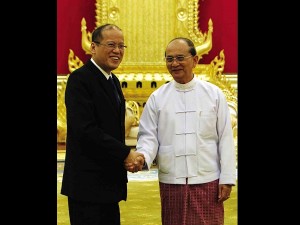Aquino joins WEF panel of leaders

ECONOMIC FORUM President Benigno Aquino III is welcomed by Burmese President Thein Sein during a bilateral meeting on the sidelines of the World Economic Forum on East Asia on Friday in the Burmese capital. MALACAÑANG PHOTO
NAYPYITAW, Burma—In separate panel discussions at the 22nd World Economic Forum on East Asia, four heads of state and government expressed a desire to learn from the successes and missteps of one another and of developed nations, promote regional integration in achieving this goal, and prioritize connectivity, cooperation and inclusive growth for the region.
President Aquino said the Philippines had a lot of advantages to offer investors, citing its abundant natural resources, educated people, its commitment to democracy, serious reforms and a determined effort to stamp out corruption in the bureaucracy to show that it really means business.
He said the world had seen how his government removed a sitting Chief Justice of the Supreme Court on corruption issues, the first in the country’s history, and the trial of his predecessor in the antigraft court for the nonbailable crime of plunder.
Based on free markets
Burma President Thein Sein expressed his commitment to reform his nation’s economy away from a centralized government model to one “based on free markets.”
“I promise that we will not waver in this task,” he said, stressing the need to cooperate with the Association of Southeast Asian Nations (Asean), particularly because Burma is set to assume the Asean chairmanship in 2014.
Vietnam Prime Minister Nguyen Tan Dung expressed his country’s commitment to regional cooperation and noted the “urgency for vigorous action” to achieve Asean integration goals.
In addition to regional cooperation goal, Dung noted the opportunities for special collaboration among inland Asean states.
Laos Prime Minister Thongsing Thammavong said his country experienced rapid economic growth recently, due in part to trade facilitation and regional economic integration. This growth, he said, has led to marked declines in household poverty rates.
Future generations
Klaus Schwab, the WEF founder and executive chair, stressed the need for the WEF community to ensure that future generations benefit from the current growth. He said this would require the involvement of neighboring nations, the international community and the private sector, among other stakeholders.
More than 1,000 participants participated in the WEF East Asia, including more than 100 public figures representing 15 countries, including the heads of state or government of Laos, Burma, the Philippines and Vietnam.
More than 550 business leaders, over 60 global growth companies and nearly 300 young leaders from the Forum’s Young Global Shapers communities, together with members of civil society, academia and media convened here to discuss the challenges and opportunities facing Burma and East Asia. Next year’s WEF will be hosted by the Philippines.